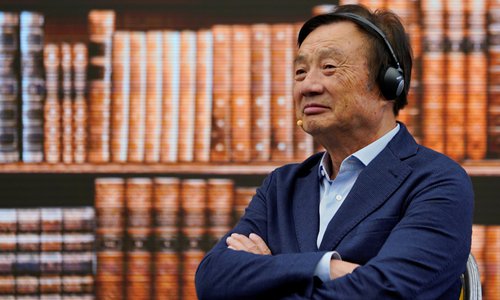Huawei teams up with CAS on technological development
By Xie Jun Source: Global Times Published: 2020/9/20 21:03:40

Ren Zhengfei
Huawei is inviting professionals across China, from top research institutions to universities and companies, to join efforts in technological research as the Shenzhen-based technology giant tries to blaze a trail out of the US blockade.
Recently, Huawei executives including founder Ren Zhengfei, visited the Chinese Academy of Sciences (CAS) to discuss fundamental research and core technology development with CAS experts and scholars. The visit came just weeks after Ren and his colleagues visited four Chinese top universities to enhance professional training.
During the visit, Ren said that Huawei attaches great importance to its cooperation with the CAS.
"Based on current cooperation between Huawei and the CAS, I hope the two sides can strengthen scientific exchanges with a more open attitude, while exploring the frontiers of science and technology, and pushing the conversion of research results into economic prowess," Ren said.
CAS dean Bai Chunli also noted that the CAS has carried out "multiple-layer", "broad" and "pragmatic" cooperation with Huawei, with this kind of teamwork having produced good results.
"I hope Huawei and the CAS can cooperate closely, combining the innovation abilities of CAS and the resources of Huawei to explore frontier technologies," Bai said.
The visit again showed Huawei's thirst for a solution following the US order limiting global supply of electronic components to the Chinese tech giant, analysts said.
"Huawei's current chip inventory can sustain its market share for about two years. After that, unless Huawei can come up with a good solution to obtain chip supplies, its market share might falter, which will be a threat to the brand's competitiveness and even survival," Sun Yanbiao, head of Shenzhen-based research firm N1mobile, told the Global Times on Sunday.
That means unless policy changes come from the US government, Huawei has to develop its own tech solutions within a rather short period, pushing it to seek cooperation with academic and research powers in China.
"It would be a win-win situation for Huawei and the CAS. The CAS can help Huawei with research equipment and R&D projects, while Huawei could support some CAS projects with capital," veteran industry analyst Ma Jihua told the Global Times.
According to him, there's no guarantee that input will yield results, but considering that China's chip technologies do not lag too far behind, it's hopeful that Huawei and its partners can work out independent tech solutions that can allow China to produce high-end chips by itself.
"Faced with the US crackdown, China needs to complete technological independence in just about one-tenth of the normal time needed for such a process to take place. But it has to try," Ma said.
He added that China is also demonstrating its determination in technological independence to the world, thus prompting US enterprises to exert pressure on the US government as they would experience great losses if China could make everything on its own and no longer needs to import products from the US.
Microsoft founder Bill Gates also questioned in a recent interview whether it is good to "force China to become fully self-sufficient", adding that cutting supplies to China would cause job losses and the US would sustain the most serious damage in the long run.
Posted in: ECONOMY